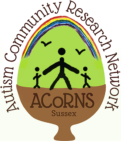Monthly Autism Reading Group (June 2021) – Mental Health services for autistic people
By Prof Nicola Yuill The topic for this session of the reading group was mental health, something that has loomed large in the news during Covid-19 restrictions. We had two readings, one giving figures for conditions that can affect many autistic people, such as Attention Deficit Hyperactivity Disorder, and the other being a very thoughtful […]
Monthly Autism Reading Group (June 2021) – Mental Health services for autistic people Read More »
